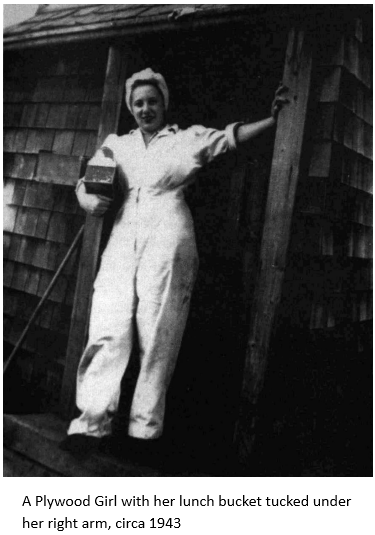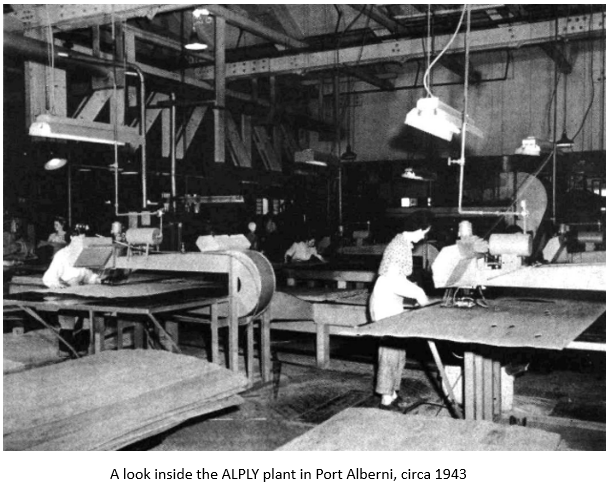The term ‘Plywood Girl’ holds significant pride for many women who worked at the Alberni Plywood Plant during World War II. The HR MacMillan Export plywood plant in Port Alberni, nicknamed ‘ALPLY’, was opened to meet wartime demand for plywood products to manufacture things like ammunition boxes and Mosquito warplane components. Due to many men joining the military, the workforce was reduced and management realized they were facing a labour shortage. So, to staff the plant, they looked to women ages sixteen and older to work at the plant.
They worked on the assembly line at first, doing the ‘unskilled labour’ jobs like layering the veneer into sheets, bundling the plywood, and loading the boxcars. However, as more men enlisted, women began to fill the positions previously deemed ‘men’s jobs,’ like the cutter, who was responsible for cutting any flaws out of the veneer. Of the approximately 350 workers at the plant during the War, 80 percent were women, and they were known as the ‘Plywood Girls’.
Despite being paid 26 percent less than their male counterparts, these women were generally quite pleased to be working at ALPLY. Their other job opportunities were mostly in the service sector, paid poorly, and had the women working undesirable hours. In contrast, working at the mill with other women was rewarding and enriching. The work was physical, but not impossible. One woman is quoted as saying, “[…] if this is how hard my father works, where’s the big deal? This is good exercise.” The women also enjoyed each other’s company while at work and spent much of their leisure time together. Playing softball or going to dances together were common after-work activities for this close-knit group.
After 49 years of operation, the mill closed in 1991 and was demolished in 1997. Nonetheless, the legacy of the Plywood Girls’ work at ALPLY will always be a part of Vancouver Island’s history. Their story is one of hard work and determination to thrive in spite of gender discrimination, proving that women have a place in the forest industry.
Information from this article comes from the study “Women and Gender Ideology at the Port Alberni Plywood Plant, 1942-1991” by Susanne Klausen. There is also a short documentary called “The Plywood Girls” from 1999, featuring multiple interviews of ALPLY workers.
Article by Kelly K
Multicultural Research Intern
September 12, 2024
Work Cited:
Klausen, Susanne. “Women and Gender Ideology at the Port Alberni Plywood Plant, 1942-1991”
Erudit.Org, Canadian Committee on Labour History,
www.erudit.org/en/journals/llt/1998-v41-llt_41/llt41rr02.pdf.
A link to the documentary: The Plywood Girls | Video Out – Vancouver, British Columbia




